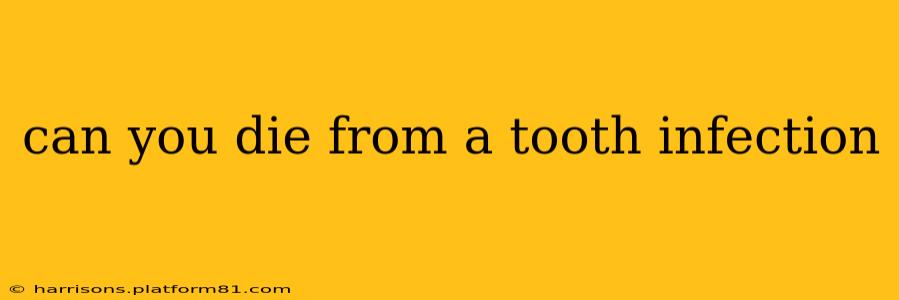Can You Die From a Tooth Infection? Understanding the Risks of Untreated Dental Issues
The short answer is yes, although it's rare, you can die from a severe tooth infection left untreated. While it's not the most common cause of death, a seemingly minor toothache can escalate into a life-threatening condition if not addressed promptly by a dentist. This article will explore the potential dangers and answer common questions surrounding this serious topic.
What Happens When a Tooth Infection Goes Untreated?
A tooth infection, or dental abscess, occurs when bacteria infect the pulp (the soft tissue inside your tooth) or the surrounding tissues. This infection can start small, causing pain, swelling, and sensitivity. However, if left untreated, the infection can spread beyond the tooth itself, leading to more severe complications.
The bacteria release toxins that can enter the bloodstream, causing a systemic infection. This is known as sepsis, a potentially fatal condition characterized by overwhelming inflammation throughout the body. Sepsis can lead to organ failure, shock, and death if not treated aggressively.
Can a Tooth Infection Cause Sepsis?
Yes, a tooth infection is a potential cause of sepsis. The bacteria responsible for the infection can travel from the mouth, through the bloodstream, to other parts of the body, leading to a widespread inflammatory response. Risk factors such as weakened immune systems, underlying health conditions, and delayed treatment significantly increase the likelihood of sepsis developing from a dental abscess.
What are the Symptoms of a Serious Tooth Infection?
Recognizing the signs of a serious tooth infection is crucial for seeking immediate medical attention. Symptoms beyond typical toothache pain can include:
- Severe, throbbing pain: The pain isn't just a dull ache; it's intense and persistent.
- Swelling in the face, jaw, or neck: This indicates the infection is spreading beyond the tooth.
- Fever and chills: High fever is a classic sign of a systemic infection.
- Difficulty swallowing or breathing: This suggests the infection might be affecting the airway.
- Pus discharge: Drainage of pus from the affected area is a clear sign of infection.
- Fatigue and malaise: Feeling generally unwell and exhausted.
How is a Tooth Infection Treated?
Treatment for a tooth infection typically involves a combination of approaches:
- Root canal: This procedure removes the infected pulp and cleans the inside of the tooth. The tooth is then sealed to prevent further infection.
- Extraction: In severe cases, the tooth may need to be extracted.
- Antibiotics: Antibiotics are prescribed to combat the bacterial infection and prevent its spread. This is crucial in cases where the infection has already spread beyond the tooth.
- Drainage: A dentist might need to drain an abscess to relieve pressure and allow the infection to heal.
How Can I Prevent a Tooth Infection?
Prevention is always better than cure. Practicing good oral hygiene is essential to prevent tooth infections:
- Brush and floss regularly: This removes food particles and plaque that contribute to bacterial growth.
- Regular dental checkups: Regular visits to the dentist allow for early detection and treatment of any dental problems.
- Maintain a healthy diet: A balanced diet supports overall health, including oral health.
What Should I Do If I Suspect a Serious Tooth Infection?
If you experience any of the symptoms mentioned above, especially severe pain, swelling, or high fever, seek immediate medical attention. Don't delay treatment, as the infection can rapidly worsen and become life-threatening. Contact your dentist or doctor immediately.
This information is for general knowledge and does not constitute medical advice. Always consult with a qualified healthcare professional for any health concerns. Prompt treatment of a tooth infection is vital to prevent serious complications.
